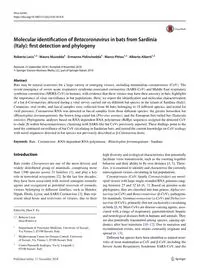
2018 Molecular identification of Betacoronavirus in bats from Sardinia (Italy)_ first detection and phylogeny PDF
Preview 2018 Molecular identification of Betacoronavirus in bats from Sardinia (Italy)_ first detection and phylogeny
Vol.:(0123456789) 1 3 Virus Genes https://doi.org/10.1007/s11262-018-1614-8 Molecular identification of Betacoronavirus in bats from Sardinia (Italy): first detection and phylogeny Roberta Lecis1,2 · Mauro Mucedda3 · Ermanno Pidinchedda3 · Marco Pittau1,2 · Alberto Alberti1,2 Received: 25 September 2018 / Accepted: 8 November 2018 © Springer Science+Business Media, LLC, part of Springer Nature 2018 Abstract Bats may be natural reservoirs for a large variety of emerging viruses, including mammalian coronaviruses (CoV). The recent emergence of severe acute respiratory syndrome-associated coronavirus (SARS-CoV) and Middle East respiratory syndrome coronavirus (MERS-CoV) in humans, with evidence that these viruses may have their ancestry in bats, highlights the importance of virus surveillance in bat populations. Here, we report the identification and molecular characterization of a bat β-Coronavirus, detected during a viral survey carried out on different bat species in the island of Sardinia (Italy). Cutaneous, oral swabs, and faecal samples were collected from 46 bats, belonging to 15 different species, and tested for viral presence. Coronavirus RNA was detected in faecal samples from three different species: the greater horseshoe bat (Rhinolophus ferrumequinum), the brown long-eared bat (Plecotus auritus), and the European free-tailed bat (Tadarida teniotis). Phylogenetic analyses based on RNA-dependent RNA polymerase (RdRp) sequences assigned the detected CoV to clade 2b within betacoronaviruses, clustering with SARS-like bat CoVs previously reported. These findings point to the need for continued surveillance of bat CoV circulating in Sardinian bats, and extend the current knowledge on CoV ecology with novel sequences detected in bat species not previously described as β-Coronavirus hosts. Keywords Bats · Coronavirus · RNA-dependent RNA polymerase · Rhinolophus ferrumequinum · Sardinia Introduction Bats (order Chiroptera) are one of the most diverse and widely distributed group of mammals, comprising more than 1300 species across 21 families [1], and play a key role in terrestrial ecosystems [2]. In the last few decades, they have been associated with several emergent zoonotic agents and recognized as potential reservoir of zoonotic viruses belonging to different families, such as Hendra, Nipah, Ebola, Lyssa, and SARS Coronavirus [3]. Bats rep- resent ideal hosts and reservoirs of viruses, due to their high diversity and ecological characteristics that potentially facilitate virus transmission, such as the roosting together behavior and their ability to fly over distance [4, 5]. There- fore, it is essential to identify and characterize the currently unrecognized viruses circulating in bat populations. Coronaviruses (CoV, family Coronaviridae) are envel- oped viruses with large single-stranded RNA genomes rang- ing between 27 and 32 kb [6, 7]. Based on genome-scale phylogenies, they are classified into four genera: Alphacoro- navirus (α-CoV) and Betacoronavirus (β-CoV), pathogenic for mammals, Gammacoronavirus (γ-CoV) and Deltacoro- navirus (δ-CoV), primarily (but not exclusively) circulating in birds [8, 9]. Most CoVs are disease-causing agents, asso- ciated with a range of respiratory, gastrointestinal, hepatic and neurological diseases both in humans and animals. They are also potentially transmitted among species, causing epi- demics after host transition [10–12]. Due to mutation and recombination events, new strains constantly originate and spread [4, 13]. Different bat species have been identified as natural reser- voirs of most mammalian α-CoV and β-CoV, including the Severe Acute Respiratory Syndrome SARS-CoV, and the Edited by Zhen F. Fu. * Roberta Lecis
